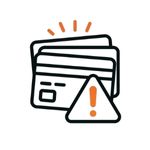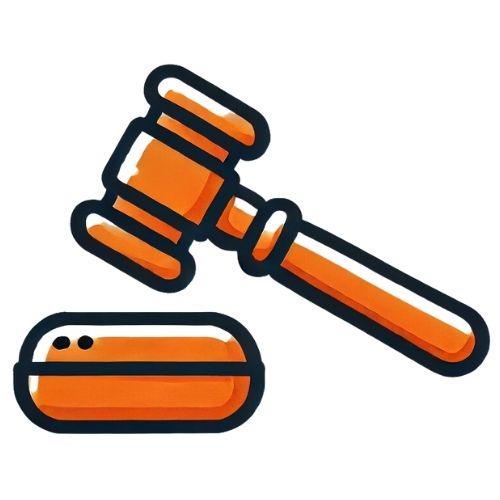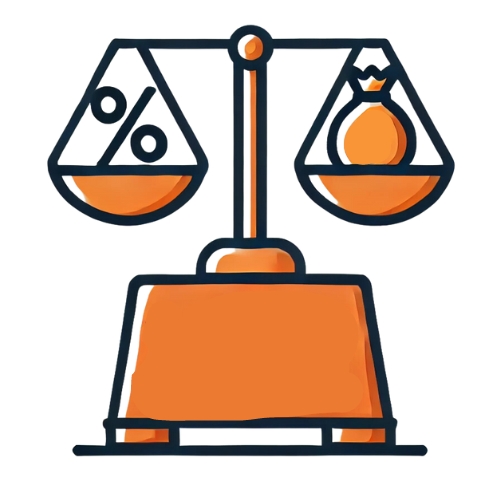
Applying for a personal loan can help you manage important expenses, but approval is never guaranteed. In South Africa, lenders assess applications carefully based on factors such as credit score, income, employment stability, and overall financial health. If your loan request has been declined, it is usually linked to specific issues. Understanding these reasons can help you strengthen future applications and improve your chances of approval.
Key Takeaways
- Loan Applications Are Assessed On Multiple Factors: Lenders review your credit score, income, employment history, and existing debts before approving a loan application.
- Common Reasons For Loan Rejection Include Poor Credit And Low Income: Issues such as a low credit score, being blacklisted, insufficient income, or unstable employment can result in a declined application.
- Improving Financial Health Can Boost Future Approval Chances: Strengthening your credit profile, fixing report errors, increasing your income, and reducing existing debt can significantly improve your chances when reapplying for a loan.
What Is a Personal Loan?
A personal loan refers to a sum of money borrowed from a lender, which must be repaid over an agreed period through monthly instalments that include interest charges. Financial institutions such as banks, credit unions, and online lenders provide various loan products, including personal loans, to individuals who meet certain qualifying criteria.
When assessing a loan application, lenders carefully evaluate factors such as your credit score, credit history, debt-to-income ratio, and overall cash flow to determine your ability to repay the borrowed amount. A personal loan is typically intended to cover personal financial needs, which may include debt consolidation, paying for medical expenses, funding holiday plans, or managing unexpected costs that are not covered by medical insurance.
A loan rejection isn’t the end of the road. In Declined by Your Bank? Get a Loan from an Online Lender, we break down what to do next and how online lenders could offer a faster, more accessible path to funding.
About Arcadia Finance
Obtain your loan hassle-free with Arcadia Finance. Applying is free, and you can choose from a range of 19 reputable lenders. Each lender follows the regulations laid out by the National Credit Regulator in South Africa.
Common Reasons Why You May Have Been Rejected for a Loan

Poor Credit Score
If you have mismanaged your debt, it will reflect negatively on your credit score, which is recorded by credit bureaus. Lenders have access to these records and are likely to reject your application if your history shows poor repayment behaviour. Every South African is entitled to one free credit report per year from each bureau, which can help you check if your record is in good standing.

Blacklisted, Under Debt Review, or Judgement Against Your Name
Being blacklisted, undergoing debt review, or having a judgement issued against your name will result in an automatic loan rejection. Under the National Credit Act, lenders are prohibited from offering credit in such circumstances, protecting both borrowers and financial institutions.

Too Many Recent Credit Applications
Each time you apply for credit, a hard enquiry is recorded on your credit report. If you’ve submitted multiple applications for loans or credit cards within a short space of time, it can signal to lenders that you may be under financial pressure or overly reliant on borrowing. This pattern not only lowers your credit score but also raises red flags about your credit behaviour. Lenders may view frequent applications as a sign of risk, so it’s best to apply only when necessary and allow time between applications.

Requesting an Unrealistic Loan Amount
Requesting a loan amount that far exceeds what your income or credit profile can reasonably support is a common cause for rejection. Lenders conduct thorough affordability assessments and will decline applications where the proposed repayments would place undue strain on your budget. It’s essential to request a realistic amount that reflects your current financial circumstances. Make use of online affordability calculators or pre-qualification tools to help you apply within a suitable range.

Red Flags in Bank Statements
Your bank statements provide lenders with insight into your spending habits and overall financial stability. Indicators such as frequent overdrafts, returned debit orders, irregular salary payments, or high-risk transactions (like gambling) may suggest poor money management. Even if other aspects of your application are solid, these red flags can lead to a decline. To boost your credibility, aim to maintain a stable, healthy bank account for at least three months prior to applying for a loan.

Garnishee Orders
A garnishee order allows a third party to collect debt repayments directly from your salary through your employer. This indicates to lenders that you may already be struggling to meet financial obligations and often appears on your credit record. As a result, most lenders will be reluctant to offer additional credit.

Insufficient Income for the Loan Amount Requested
Responsible lenders are required to conduct affordability assessments before granting credit. If you have too many financial commitments or if your income is insufficient to cover the proposed loan repayments, your application will likely be declined.

Employment History or Job Type Concerns
Applicants working as freelancers, contractors, or small business owners may face more scrutiny, as lenders prefer borrowers with stable and predictable incomes. Stability and future earning potential are assessed carefully, and those with sustainable careers in high-demand fields may still qualify. Frequent job changes can also negatively influence an application, as it raises concerns about job security.
Additionally, if you have been in your current role for less than three months, you might be rejected due to the requirement for stable employment history and confirmation that you have passed your probation period.

No Credit History
Having no credit history can also work against you. Without a record showing how reliably you meet financial obligations, lenders cannot accurately assess the risk of lending to you. Opening a small store account or taking out a credit card and managing it responsibly can help you establish a positive credit record.

Incorrect Information or Dishonesty on the Application
Providing false information or failing to disclose debts on your loan application is a serious issue. Lenders verify the details submitted, and discrepancies can lead to immediate rejection or potential legal consequences.

Age Restrictions
Applicants under the age of 18 are automatically ineligible for credit. Older applicants, particularly those over 75 years of age, may also face limitations, especially for long-term loans like home finance. However, individuals over 75 who are still earning a regular income may still qualify for short-term loans, depending on the lender’s assessment.

Concentration Risk in Sectional Title Developments
Lenders are cautious when financing multiple properties within the same sectional title complex. If too many units are financed within a single development, there is a risk that financial difficulties within the body corporate could affect individual owners. Issues such as rising special levies or unfinished developments could reduce property values and make bond repayments more difficult, leading banks to restrict lending under these circumstances.

Property Valuation Lower Than Purchase Price
If an independent property valuation reveals that the home you wish to purchase is worth significantly less than the agreed sale price, your loan application may be rejected. Lenders will not risk financing a property at a value higher than its true market worth, as this could leave borrowers exposed to financial loss if they need to sell the property in future.
If your loan application has been rejected, don’t lose hope. There are ways to strengthen your profile. One approach is to learn what a guarantor is and how having one might boost your credibility in the eyes of lenders, especially when your credit score is holding you back.

How to Prevent Future Loan Rejections
Getting declined for a personal loan can be discouraging, but it also offers an opportunity to reassess and improve your financial standing. By taking a few practical steps, you can significantly boost your chances of approval the next time you apply. Here are some effective ways to prevent future loan rejections:
- Prequalify before applying: Use soft credit checks to see your chances without affecting your score, helping you avoid unnecessary rejections.
- Maintain a healthy credit score: Pay bills on time, keep borrowing balances low, and avoid opening too many new accounts at once.
- Reduce existing debt: Lower your outstanding loans and credit card balances to improve your debt-to-income ratio and create a better impression with lenders.
- Stabilise your income: Stay in steady employment where possible and provide consistent income records, especially important for the self-employed.
- Check your credit report regularly: Review your reports for errors or outdated information, and correct any issues before applying.
- Consider a guarantor or collateral: Strengthen your application by adding a trusted guarantor or securing the loan with savings or assets.
- Apply with the right lender: Different lenders have different criteria; choose one that fits your financial profile and credit history.
- Speak to a financial advisor or debt counsellor: Professional guidance can help you understand why you were declined and how to improve your financial standing.
- Avoid frequent applications: Multiple applications in a short time can lower your credit score and raise red flags with lenders.
- Be honest and accurate: Always provide truthful, complete information, as any inconsistencies may lead to automatic rejection.
What You Can Do Next
Once you have identified the possible reason behind the rejection of your loan application, the next step is to address any issues and improve your financial situation before submitting a new application. Strengthening your position will provide you with a higher likelihood of being approved in future applications.
Fix Errors On Your Credit Report
Should you notice any clear mistakes on your credit report, it is advisable to reach out to the relevant credit bureau to dispute and correct these inaccuracies. If fraudulent activity has been recorded, it must be properly investigated and removed from your profile to prevent it from affecting your creditworthiness.
Build Your Credit
If your credit score is low or non-existent, focus on building a stronger profile by consistently paying more than the minimum instalments on your credit accounts. Maintaining timely payments without delays will gradually improve your score. You may also consider applying for a credit-building loan, though it is wise to avoid frequent credit applications, as multiple hard enquiries can negatively impact your score.
Grow Your Income
Improving your earnings can help you meet the affordability checks imposed by lenders. This can be achieved by taking on additional income opportunities, such as part-time work or side businesses, or by seeking a salary increase in your current employment.
Lower Existing Debt
Reducing your outstanding debt will strengthen your financial profile when applying for future credit. Aim to pay more than the minimum amounts wherever possible and set up a structured repayment plan to prevent missed instalments. If managing several debts becomes challenging, you could consider seeking assistance from a reputable debt consolidation provider.
Conclusion
Understanding why a personal loan application may be declined is essential for improving your future chances of approval. Factors such as poor credit, unstable income, high debt levels, or providing incorrect information can all lead to rejection. By addressing these issues, whether by building a stronger credit history, increasing your earnings, correcting errors on your credit report, or reducing existing debt, you can strengthen your financial position. Careful preparation and research when applying will not only increase your likelihood of approval but also help you secure better loan terms suited to your needs.
Frequently Asked Questions
First, try to understand the reason for the rejection. This will guide your next steps, which could be improving your credit score, reducing your debt-to-income ratio, or fixing errors in your application.
There’s no set timeframe, but it’s usually advisable to wait until you’ve addressed the reasons for the initial rejection. This could mean waiting a few months to improve your credit score or reduce your debt-to-income ratio.
This depends on the lender’s policies. Some lenders may allow you to appeal the decision or provide additional information to support your application.
Your credit history plays an important role in your loan application. Lenders use it to gauge your financial responsibility and ability to repay the loan. A good credit history can improve your chances of approval, while a bad history can lead to rejection.
Yes, the National Credit Act of South Africa regulates lending and borrowing activities. It requires lenders to conduct affordability assessments before granting loans and prohibits lending to applicants with outstanding defaults.




